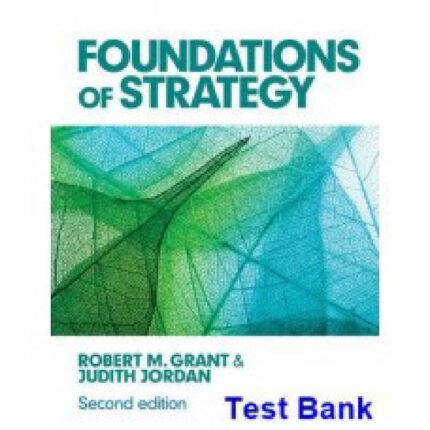Management Accounting Information For Decision Making And Strategy Execution 6th Edition by Anthony A. Atkinson -Test Bank
Chapter 11 Financial Control
Objective 1
Financial control involves the use of financial measures to assess organizational and management performance.
Answer: TRUE
Diff: 1
Terms: financial control
Objective: 1
AACSB: Reflective thinking
Financial measures identify what is wrong with an organization, not simply provide a signal that something needs attention.
Answer: FALSE
Explanation: Financial measures signal poor performance but do not identify what has gone wrong
Diff: 1
Terms: financial measures
Objective: 1
AACSB: Reflective thinking
Nonfinancial measures can highlight falling sales and profits in an organization, but only financial measures can identify why this is occurring.
Answer: FALSE
Explanation: Financial measures will highlight the falling profit and sales but not why–that is the role of the nonfinancial measures
Diff: 1
Terms: nonfinancial measures
Objective: 1
AACSB: Reflective thinking
Properly chosen nonfinancial measures anticipate and help to explain financial results in an organization.
Answer: TRUE
Diff: 1
Terms: nonfinancial measures
Objective: 1
AACSB: Reflective thinking
Measure of financial control highlight: A) falling profits.
B) poor quality. C) high prices.
D) unsatisfactory service. Answer: A
Diff: 1
Terms: financial control
Objective: 1
AACSB: Reflective thinking
All of the following are reasons that financial control may be an ineffective scorecard EXCEPT that:
A) it fails to identify the causes or drivers of performance.
B) it focuses on financial measures while ignoring other important attributes of performance. C) it focuses on long-term rather than short-term performance measures.
D) it is an aggregate, rather than a detailed measure of performance. Answer: C
Diff: 2
Terms: financial control
Objective: 1
AACSB: Reflective thinking
Performance measures for financial control include all of the following EXCEPT:
reduced cycle times.
ROI ( return on investment) and economic value added.
profit.
cost.
Answer: A
Diff: 2
Terms: financial control, performance measures
Objective: 1
AACSB: Reflective thinking
Which of the following statements is FALSE regarding financial and nonfinancial measures of performance?
A) Nonfinancial measures may help to anticipate and explain financial results. B) Financial measures include aggregate measures.
C) Nonfinancial measures may help to identify the causes of financial results. D) Financial measures are lead indicators of future success.
Answer: D
Diff: 2
Terms: financial measures, nonfinancial measures
Objective: 1
AACSB: Reflective thinking
9) What is financial control and how does it relate to nonfinancial measures?
Answer: Financial control involves the use of financial measures to assess organization and management performance.
Financial measures provide a signal that something is wrong, while nonfinancial measures identify what is wrong. For example, falling sales, a financial measure, indicates that something is wrong. However, the falling sales may result from poor quality, poor service, or high prices, which would be identified by the nonfinancial measures of the organization. Diff: 2
Terms: financial control, financial measures, nonfinancial measures
Objective: 1
AACSB: Reflective thinking
MAL: This question is not available in MyAccountingLab.
10) Discuss at least two inefficiencies of financial control.
Answer: First, financial control focuses on financial measures that do not measure other important attributes such as product quality, employee satisfaction, and customer service. Because these elements and others are important to the organization’s long-term success, they also should be measured and monitored.
Financial control measures the effect of the overall level of performance and ignores the performance achieved on a more detailed level. For this reason, financial control does not suggest how to improve performance, but only serves as a signal of potential problems and opportunities.
Financial control is oriented to short-term performance and it only considers how well the organization has performed this quarter or this year. This preoccupation with short-term success is debilitating because little attention gets focused on long-term improvement. Diff: 2
Terms: financial control, cost center, financial measures
Objective: 1
AACSB: Reflective thinking
MAL: This question is not available in MyAccountingLab.













Reviews
There are no reviews yet.